News
Top Liveaboards for Small Groups
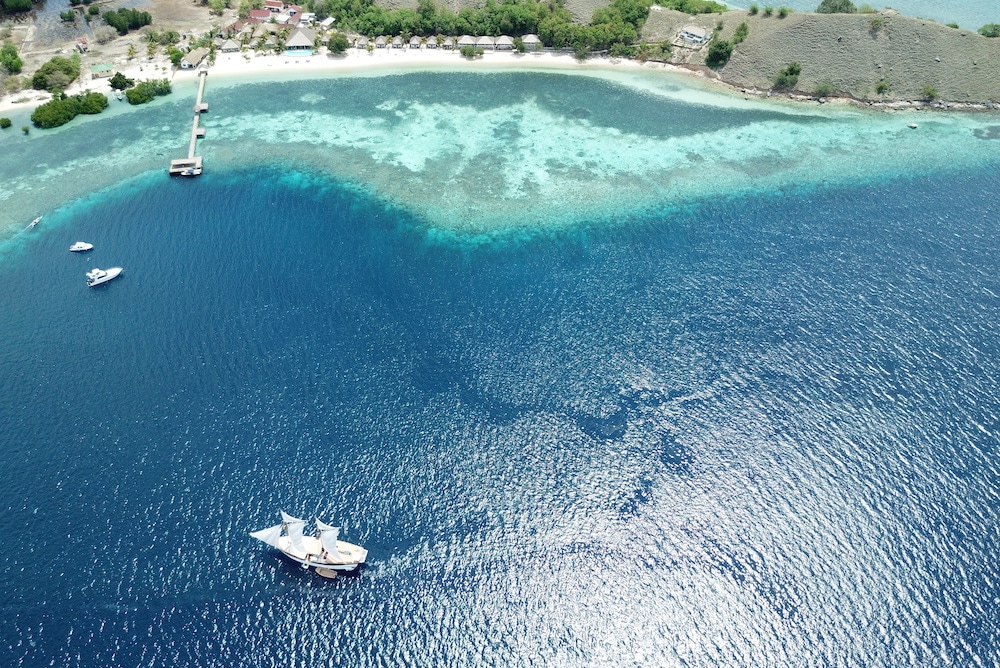
Part of the fun of joining a liveaboard safari is meeting new people from around the world and being part of a like-minded group of divers exploring the ocean. Sometimes divers want a quieter experience on the seas with fewer people around them. Thankfully, there are some great liveaboards that cater specifically for small groups and offer island-hopping, sailing, and land excursions whilst visiting world-class dive destinations.
Here are our top liveaboards for small groups:
Tanaka, Indonesia
Indonesia needs no introduction as a world-class diving destination and is popular with divers from around the globe. It is one of the most species rich dive locations on earth and has dives suitable for every type of diver. Komodo is an Indonesian highlight with its rare pink sands, and offers muck diving, large pelagic species and great water visibility. Komodo Liveaboard diving with the Tanaka phinisi is ideal for small groups, families and couples. Built in 2014, she caters for just 14 guests and offers safaris from 3 to 10 nights long in the Komodo National Park.
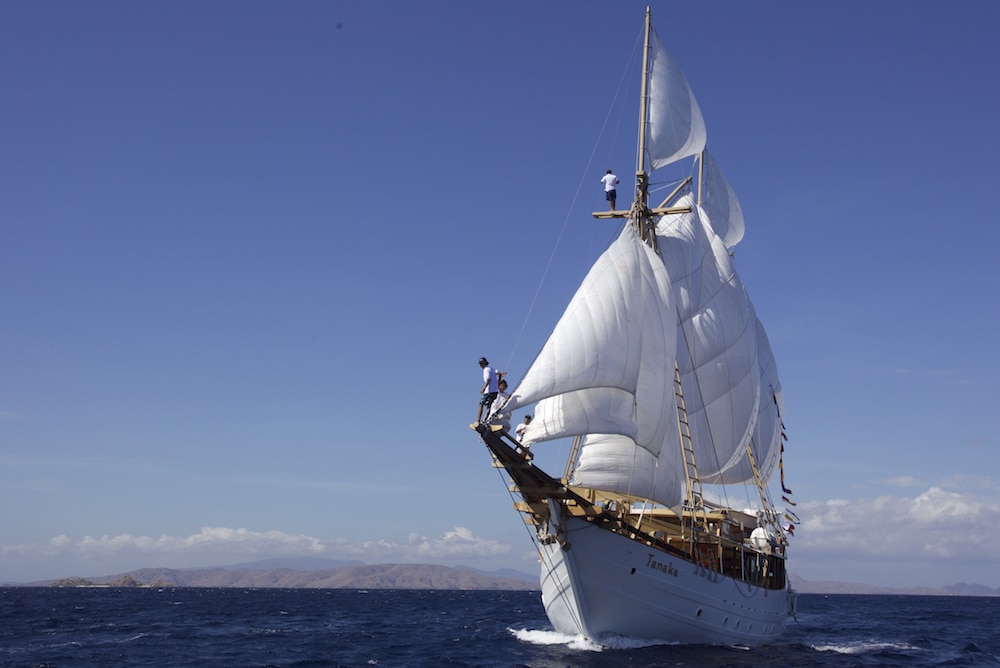
The dive sites of Komodo are ideal for both macro photographers searching for tiny critters and for fans of big marine life such as mantas, dolphins, hammerhead sharks and mola mola. Manta Alley and Manta Point fare known for large groups of visiting manta rays and Rinca Island is the place to visit to see Komodo dragons and to search for macro life amongst the corals. Batu Balong has abundant and colourful corals on the reef and abundant fish life, making it one of the flagship Komodo dives. Bima is ideal for muck diving and the volcanic island of Sangeang has bubbling black volcanic sands, thanks to underwater vents below.
The amount and diversity of marine life at Komodo is staggering and includes over 1000 fish species, plus highlights such as bamboo sharks, marble rays, dusky sharks, leaf fish, pygmy seahorses, octopi, frogfish, reef sharks, dugong, mandarin fish and more.
Currents can be strong, and the diving is best-suited to experienced divers. The best time to dive Indonesia is during May to September when the conditions are calmer.
Aqua Tiki II, French Polynesia
French Polynesia is made up of 118 islands and was one of the last places on Earth settled by humans. Many of the islands are still uninhabited and they are a topical paradise; with white-sand beaches and palm-covered islands to explore, diverse underwater landscapes and abundant marine life. Being remote, the dives sites of French Polynesia are best accessed by liveaboard. The Aqua Tiki II catamaran is well-suited for small groups visiting French Polynesia. She caters for just 8 guests and has a lounge, cocktail bar, library, outdoor dining area and two trampolines. Divers can enjoy a variety of dive sites plus pristine beaches, water sports and island-hopping to meet the locals.
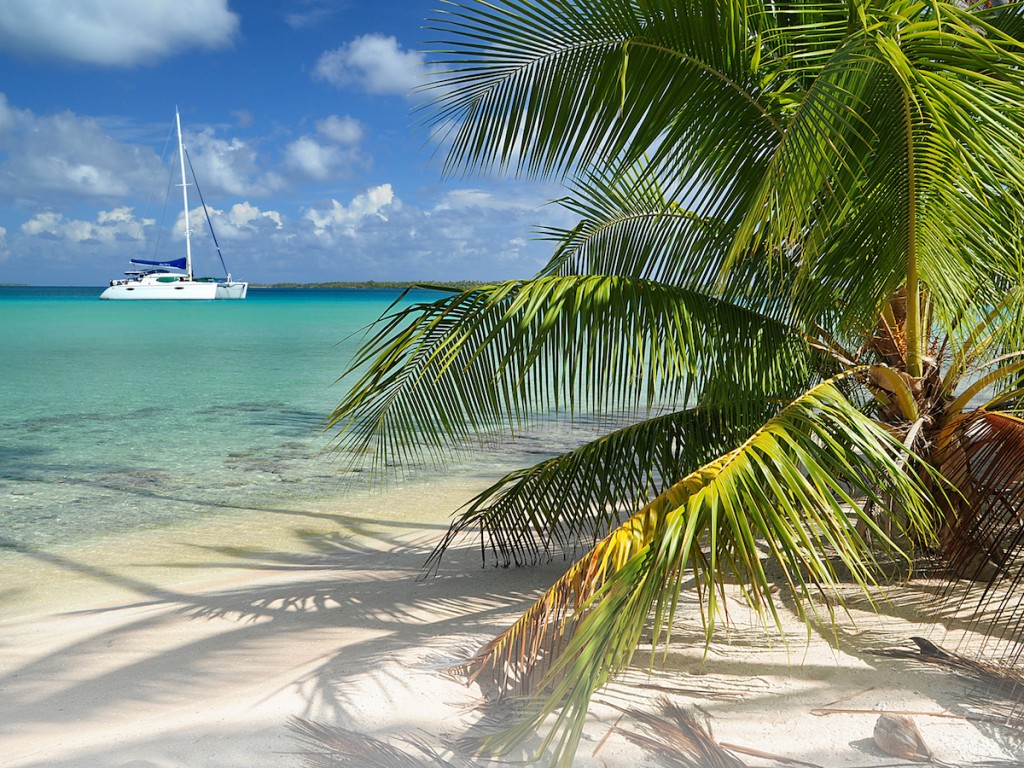
The Tuamotu archipelago and the Society Islands are popular for diving in Polynesia, and the Tuamotu archipelago is home to two of the best diving destinations; Rangiroa and Fakarava. Rangiroa is one of the largest atolls in the world, at 170 km2 (65.6 m2), and Fakarava is a UNESCO Biosphere Reserve. Both offer the opportunity to dive in crystal clear water whilst surrounded by marine life. The Tiputa Pass at Rangiroa has strong currents which attract grey reef sharks, occasional tiger and hammerhead sharks, manta rays, Napoleon wrasse, and numerous reef fish. Bottlenose dolphins are also seen at this dive site.
The Fakarava atoll has so much to offer that some liveaboards spend their entire itinerary at this one atoll. It is the best location in the archipelago to see sharks and is home to numerous grey reef sharks, plus plenty of manta cleaning stations.
Other Polynesia dive highlights include spawning Marbled groupers and the pristine corals of Pakaka Pass at Apataki, a vertical chasm and anemone-covered archway at Shark Hole in Tikehau, plus wall diving the Outer Wall in Kauehi.
The diving is best suited to more experienced divers, as the currents in the atolls can be very strong. Scuba diving is possible all year. January to March offer the warmest water temperatures whilst July to November are drier and cooler. Humpback whales can be seen during the colder season and marbled grouper spawn in June and July.
Oceanes Dream, Madagascar
Madagascar is well-known as the place to go for wildlife and rainforest tours and to support ecotourism. It is a wildlife haven and is gaining a reputation for its equally impressive marine life. Nosy B is the main dive destination and is a busy island known for encounters with whale sharks. Whilst much of the diving is centred around Nosy B, the peaceful and tiny outlying islands are being explored and becoming more accessible thanks to liveaboard safaris.
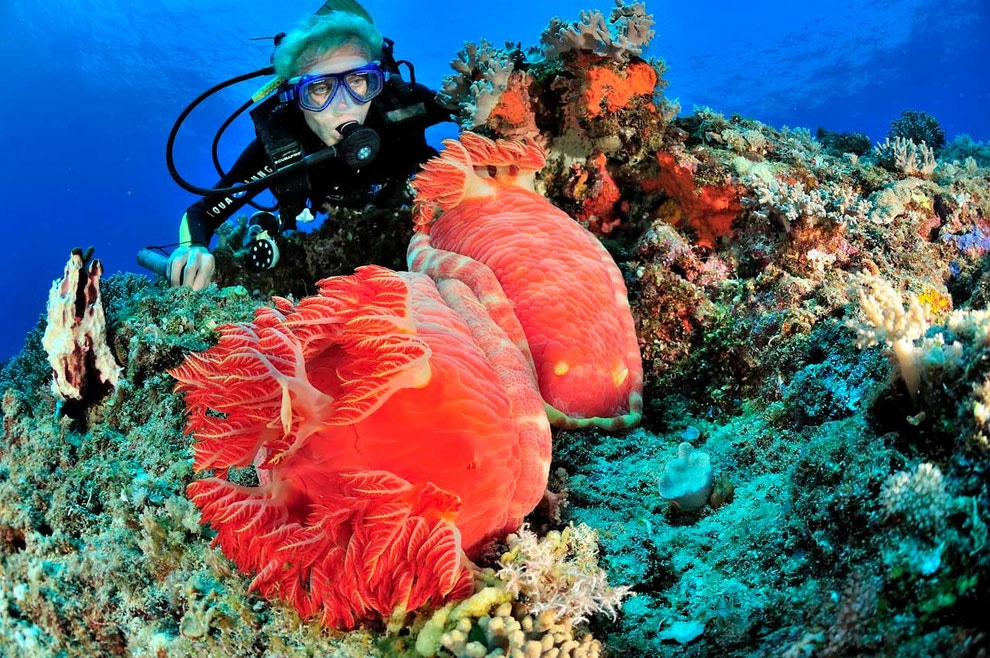
Liveaboard safaris in Madagascar are a laid-back affair, with plenty of time for relaxing in beautiful bays between dives. The Oceanes Dream catamaran is ideal for small groups wanting to explore the best of Madagascan diving. She caters to just 8 guests and explores the outlying islands in the Radames and Mitsio archipelagos.
The Radames archipelago is made up for four islands and is a large expanse of hard coral reef that has pristine dive sites. Mantas are commonly seen at cleaning stations along the reef and the dive sites are home to schools of barracuda, jacks, white tip reef sharks and hammerhead sharks. Safaris that visit this archipelago often include terrestrial wildlife tours, for lemur and chameleon spotting, and swimming with turtles is possible on Turtle Island.
The Mitsio archipelago has only one inhabited island and the area is famous for clear turquoise waters and unusual rock formations. These volcanic islands offer steep walls, tunnels and reefs, populated with manta and shark cleaning stations.
Diving is possible year-round but May to December is the main diving season, with peak season occurring in July and August. October to November is the best time to see whale sharks and humpback whales visit Madagascar between July and October.
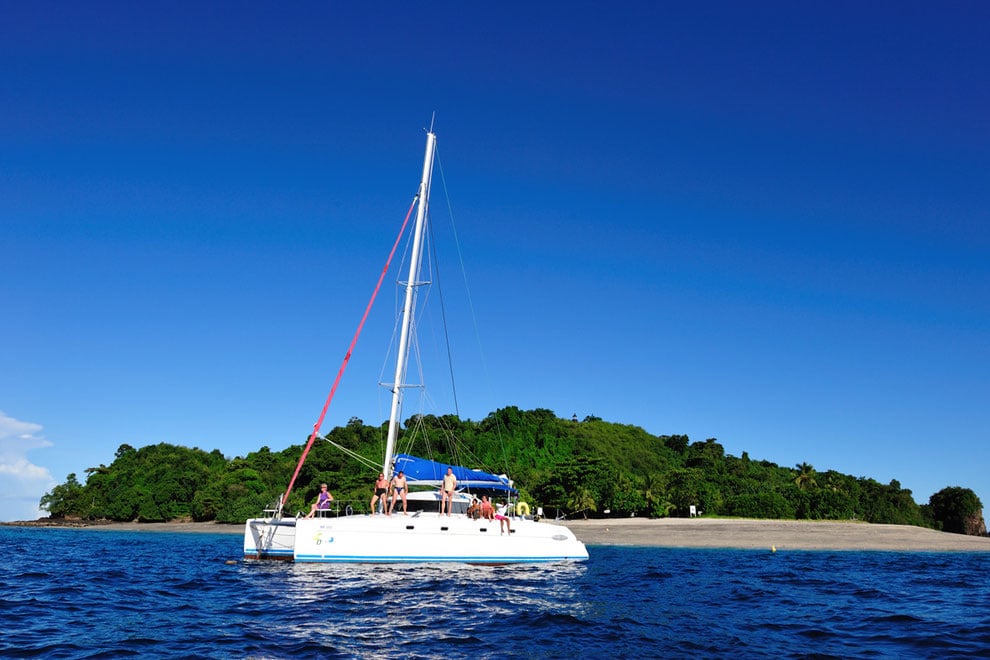
Nortada, Galapagos
The Galapagos Islands offer unique diving and wildlife watching experiences with species found nowhere else on earth. The islands are home to a vast array of animals and the Galapagos Marine Reserve is equally as impressive, being listed as a UNESCO World Heritage Site and well protected.
The islands are remote and best accessed by liveaboard safari. The 26m Nortada liveaboard is well-suited to small groups, catering for a maximum of 12 guests, and offers open circuit diving plus rebreather and technical diving support. Guests can access the best dive sites thanks to two 3m inflatable tenders. The Nortada not only offers safaris to explore the best of the Galapagos’ dive sites, she also visits the Faustro Llerena breeding centre, where guests can learn about breeding programs for giant tortoises and land iguanas.
Wolf and Darwin islands are the most well-known, and remote, dive sites of the Galapagos and are only accessible by liveaboard. Very few boats are permitted to stop at these islands and the dive sites are peaceful. The area around these islands is a highway for scalloped hammerhead sharks enroute to Cocos Island. Silky sharks, Galapagos sharks and manta rays also frequent the area. Divers are likely to also see turtles, eagle rays and abundant fish life when diving Wolf and Darwin. Wolf has underwater caverns and tunnels to explore and is a great place for night diving, whereas Darwin hosts whale sharks during June to November each year.
Other dive highlights include Cousin Rock for black corals, macro life and sea lions, plus Isabela and Fernandina for flightless cormorants, penguins, marine iguanas and other endemic species. Marine iguanas can be seen feeding underwater at Cape Douglas, and mola mola can also be seen in the area.
Sea conditions around Wolf and Darwin can be rough with large swells and currents, turning some dives into drift dives. Most of the dives are deep there and the diving is best suited to experienced divers. The dives at Cape Douglas are mostly shallow.
The Galapagos has two distinct dive seasons; the warm season of December to May and the cooler season of June to November. The warm season is calmer with less current and is ideal for hammerheads, silky and Galapagos sharks. The cool season is all about whale shark encounters, though there are still large schools of hammerheads present at this time of year.
 Discover liveaboard diving holiday solutions around the world at Liveaboard.com.
Discover liveaboard diving holiday solutions around the world at Liveaboard.com.
Gear News
Introducing the TR-80, IR-50 and CS-30 Regulators from DYNAMICNORD

Whether you are a beginner or a professional diver – with the three new main regulators from DYNAMICNORD, everyone will find their favourite regulator. They all look super stylish.
Excellent performance with the TR-80
Quality and performance are the be-all and end-all for regulators. It is not for nothing that the TR stands for Tec Reg. The innovative design of the TR-80 guarantees absolute reliability – even in ice-cold waters.

Perfect breathing effort at 0.8 J/l / certified for diving in waters below 10 degrees / structural design made of solid brass for best cold protection / membrane-compensated design with dry seal of the first stage / reduced exhalation effort thanks to optimized exhalation membrane and bubble deflector / adjustable Venturi (dive/predive) and adjustment knob for individual inhalation comfort / innovative design of the front cover prevents free-flow in strong currents or when diving with scooters / design made of sandblasted brass, matt chrome finish / 2 HP and 4 LP outlets / mouthpiece made of high-quality, anti-allergic silicone for maximum comfort.


Amazing underwater adventures with the IR-50
The IR-50 is the top regulator for advanced and experienced divers. Natural breathing is the essence of this regulator.

Ideal breathing effort at 0.8 J/l /certified for diving in waters below 10 degrees / compensated membrane / adjustable venturi (dive/predive) and adjustment knob for individual inhalation comfort/ outlet valve and deflector for minimum exhalation effort and reduction of bubbles on the face / design made of sandblasted brass, matt chrome finish / 2 HP and 4 NP outlets / mouthpiece made of high-quality, anti-allergic silicone for maximum comfort.


The Workhorse – our CS-30
For diving centres and diving beginners – the workhorse stands for strong construction, reliability and robustness. Perfect for your training.

Optimal breathing effort at 0.8 J/l /recommended for diving in waters above 10 degrees / non-compensated piston / adjustable venturi (dive/predive) / outlet valve and deflector for minimum exhalation effort and reduction of bubbles on the face / design made of sandblasted brass, matt chrome finish / 1 HP and 3 NP outlets / mouthpiece made of high-quality, anti-allergic silicone for maximum comfort.


Octopus OP-30
The OP-30 is the ideal addition to all DYNAMICNORD regulators. It is identical in construction to the CS-30.

The TR-80, IR-50, CS-30 (DIN & INT) regulators and the Octopus OP-30 are available from DYNAMICNORD dealers and in the online store.
DYNAMICNORD – Your Outdoor Companion.
Marine Life & Conservation
Paul Watson Released as Denmark Blocks Japan’s Extradition Bid

Renowned anti-whaling activist Paul Watson has been released from custody in Greenland after spending five months in detention. Denmark’s Justice Ministry rejected Japan’s request for his extradition, citing insufficient guarantees that his time already served in custody would be credited against any potential sentence.
The 74-year-old Canadian-American was arrested on July 21 in Nuuk, Greenland’s capital, when his ship docked to refuel. His arrest was based on a 2012 Japanese warrant related to a 2010 encounter in Antarctic waters. Japan alleged Watson obstructed operations and caused damage to a whaling research ship during efforts to disrupt illegal whaling. Watson has consistently denied these claims, maintaining his commitment to marine conservation.
Denmark, which oversees extradition matters for Greenland, concluded that while the legal conditions for extradition were met, the lack of assurances from Japan regarding time-served credit made extradition untenable.
In a video shared by his foundation, Watson expressed gratitude and relief, saying, “After five months, it’s good to be out… and good to know they’re not sending me to Japan.” He added that the most difficult part of his time in custody was being separated from his two young sons.
Watson is a pioneering figure in marine conservation, known for founding the Captain Paul Watson Foundation in 2022 after decades of activism with the Sea Shepherd Conservation Society. His bold efforts to defend marine life have earned him widespread support, including from celebrities and conservationists. His work has also been featured in the acclaimed reality TV series Whale Wars.
Watson’s lawyer, Jonas Christoffersen, praised the decision, stating, “We are happy and relieved that Paul Watson is now free.” He added that Watson is eager to reunite with his family and continue his vital work.
The arrest occurred while Watson’s vessel, the M/Y John Paul DeJoria, was en route to the North Pacific with a team of 26 volunteers to intercept a Japanese whaling ship. His foundation described the arrest as politically motivated and emphasized that Watson’s actions were focused on ending illegal whaling practices.
Japan resumed commercial whaling in 2019 after leaving the International Whaling Commission, asserting that whale meat is a cultural tradition. Conservationists, however, continue to challenge these practices, highlighting their impact on marine ecosystems.
Despite the challenges, Watson remains steadfast in his mission to protect marine life and bring attention to whaling practices. His dedication to ocean conservation has made him a globally respected advocate for the environment.
-

 News2 months ago
News2 months agoIconic SS United States to become the World’s Largest Artificial Reef
-

 News3 months ago
News3 months agoBook Review – 52 Assignments: Underwater Photography
-

 Gear News3 months ago
Gear News3 months agoDYNAMICNORD – New German diving brand enters the British market
-

 News3 months ago
News3 months agoExploring Cenote El Pit: A Diver’s Dream
-

 Gear News3 months ago
Gear News3 months agoTry BARE drysuits (and maybe even win one!) this Friday with Sea & Sea at North West Dive Fest
-

 Marine Life & Conservation3 months ago
Marine Life & Conservation3 months agoBook Review: Coral Triangle Cameos
-

 Blogs3 months ago
Blogs3 months agoDive the Egyptian Red Sea this Autumn with Regaldive
-

 News3 months ago
News3 months ago2024 Ocean Art Underwater Photo Competition Announced















